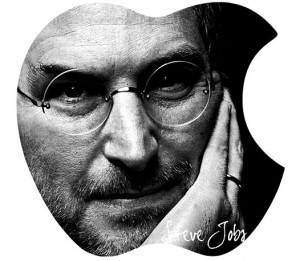Numerous secrets have been laid bare during the course of the latest legal struggle between Apple Inc. (NASDAQ:AAPL) and Samsung Electronics, the latest being an internal Samsung email unveiled today. This email shows that Samsung viewed the death of Steve Jobs in 2011 as an opportunity both for Apple and for Samsung. The Korean business gave the green light to several vicious attack ads mocking the iPhone specifically because Mr. Jobs was no longer there to counter them, an interesting comment on the entrepreneur’s mystique.
Samsung characterized the Apple founder’s demise as a temporary boon for the Cupertino firm, rocketing it into the news spotlight again. Furthermore, the company received plenty of free advertising in the form of plaudits and eulogies directed towards Mr. Jobs. As the email states, “3rd parties are all highlighting and/or supporting the … perception that Apple products are superior,” since they cast the company’s fallen founder as “a visionary and perfectionist.”
 Samsung America’s chief marketing officer, Todd Pendleton, opted to attack Apple (AAPL) directly and ridicule consumers of its products just two days after Mr. Jobs’ death, the documents reveal. The Korean firm was determined to exploit any weakness, uncertainty, and chaos following in the wake of the controversial figure’s demise to rip into Apple any way they could, and win better reputation for themselves by blackening that of their competitor.
Samsung America’s chief marketing officer, Todd Pendleton, opted to attack Apple (AAPL) directly and ridicule consumers of its products just two days after Mr. Jobs’ death, the documents reveal. The Korean firm was determined to exploit any weakness, uncertainty, and chaos following in the wake of the controversial figure’s demise to rip into Apple any way they could, and win better reputation for themselves by blackening that of their competitor.
However, from the viewpoint of a trial over patent infringement, Samsung’s natural response would seem to be – so what?
Apple Inc.’s (AAPL) release of these emails is a cunning maneuver on the part of the Cupertino firm’s lawyers, yet in the end it amounts to little more than a dirty trick. Samsung’s willingness to exploit the opportunity created by Mr. Jobs’ death was certainly ruthless, yet it has no bearing whatsoever on whether the Korean firm is violating Apple’s patents. The suit is not supposed to be decided on the basis of whether either side are “nice guys” or not.
Apple’s revelation invokes the subjective to try to sway jurors’ opinions on the main thrust of the case, which should be an objective analysis of whether Samsung has violated Apple patents and, if so, to what degree. The California electronics enterprise’s attorneys are muddying the waters with sentimentality and character assassination, when the objective evidence for at least some copycatting is quite firm already.
Fascinating as the glimpse of the “human factor” in the operation of these firms may be, to the neutral observer it would appear that Apple Inc. (AAPL) wants to cast Samsung as the “bad guy,” who “deserves” to be punished with a $2 billion fine. This is a risky move, however. While the jury may be swayed by outrage over Samsung’s undeniably cynical view of Mr. Jobs’ death, they may equally become indignant that Apple is attempting to nakedly manipulate them into accepting a perhaps excessively large award. Apple’s strategy could as easily backfire and cost them much or all of their desired damages as it could sway the jury to their side.



